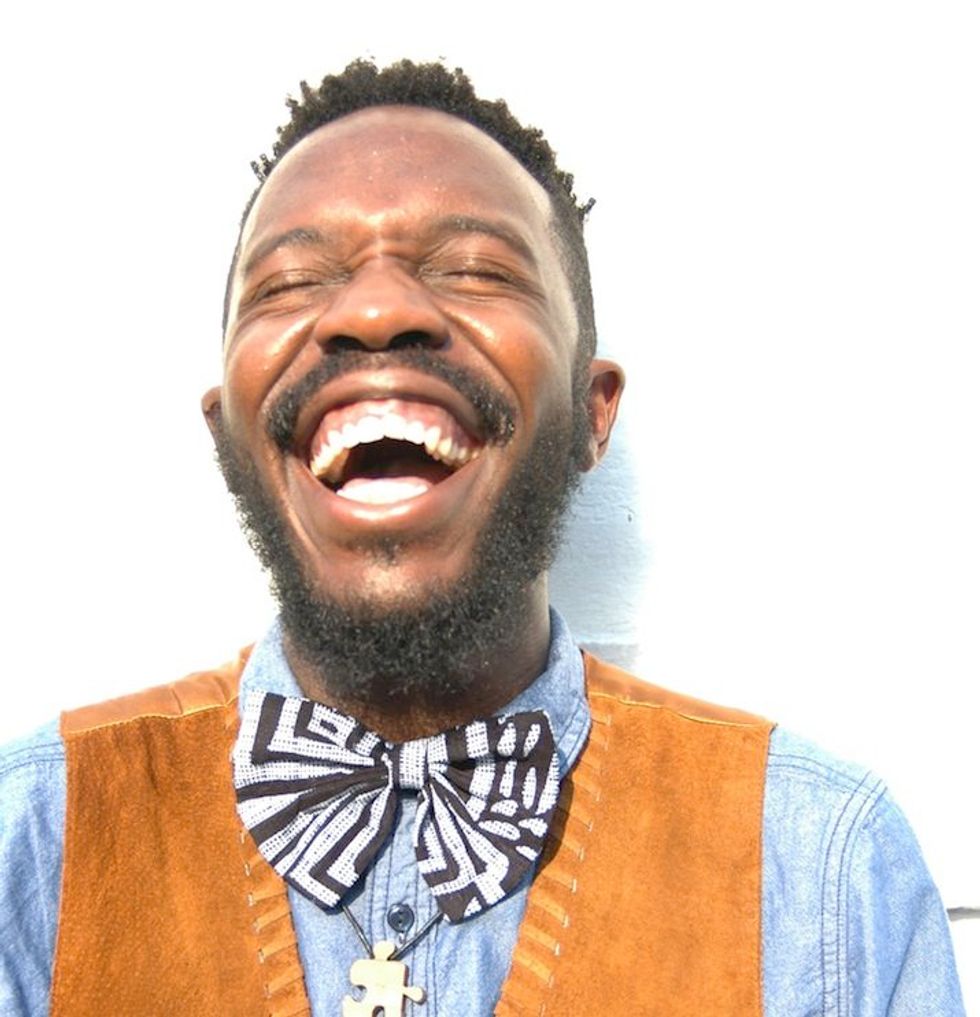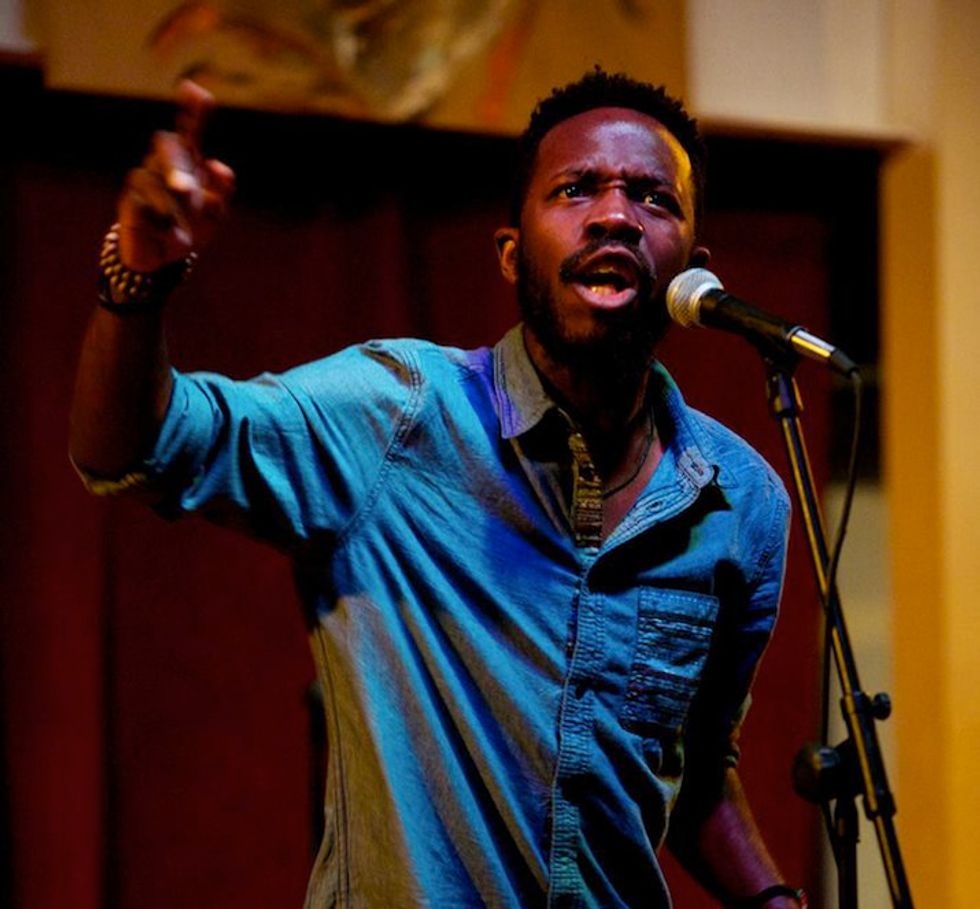"Give Me Black And African Poets," An Interview With Cameroonian Slam Champ & Author Pages Matam
Cameroonian poetry slam champion and author Pages Matam talks African writers, identity, Cameroon and much more with Hannah Giorgis.

Photo via Pages Matam
Pages Matam is a Cameroonian poet, artist, educator, playwright and event organizer. He is a WriteBloody author and 2014 National Poetry Slam champion, and the recipient of numerous other awards for his work spanning education, violence and abuse trauma work, and youth advocacy. His collection of poems and short stories, The Heart Of A Comet, was published last month. Among other community roles, Pages is a cultural ambassador in the "Immigrants Contribute" campaign of the Office of Human Rights of D.C. and a teaching artist and assistant coordinator of youth programs at Split This Rock, which uses poetry to foster social change. He also leads workshops on creative writing, visual and performance art therapy for youth dealing with trauma. Pages has opened for Chrisette Michelle, Raheem DeVaughn, and Afrika Bambaata, and has shared the stage with Common, Mos Def, Rosario Dawson, Amiri Baraka, Sonya Renee, Sunny Patterson, Rudy Francisco, Saul Williams, Black Ice, Ainsley Burrows, Joshua Bennett, and many others. I caught up with him to talk poetry, identity, Cameroon and African poets, and much more.
Hannah Giorgis for Okayafrica: Tell me a little bit about yourself. Where were you born? Where do you consider home? What language do you curse in when you are the angriest?
Pages Matam: I was born in Yaounde, Cameroon. I lived between Africa and Europe for a bit, then immigrated to the U.S. when I was about 11 years old--first to Northeast DC, but I’ve been living around different parts of Maryland and such since then. I am a gummy bear elitist, bow tie enthusiast, anime fanatic, professional hugger. I consider home wherever there are people filled with love ready to welcome me. I've found home in many places I never thought I would, but I definitely identify with Cameroon being home before anything else. When I am the angriest, I curse in English.
OKA: When and how did you first start writing poetry?
PM: I wrote my first poem in English, in middle school. I had a crush on a girl, so I wrote her a poem after an episode of Power Rangers where the yellow ranger fell in love with this 16th-century French poet who wrote her a poem. And I was like, “Oh shit, you can write poems and girls fall in love with you...bet.” [laughs] Pages wasn't born until years later...
OKA: When did you decide to start going by Pages? How did you come to that decision and what has been the response to it?
PM: I was first given the name Pages in high school while part of the poetry club. I used to write a lot, these 5-6 page poems. So a friend was like you should be “Pages” because you write so many pages. I said okay, then I thought I was cool and made an acronym of it. It stood for “possessing artistic gifts eloquently spoken.” The acronym stopped holding weight by the 11th grade because it was corny, but I went by Pages, no acronym, and left it at that.
Honestly, I love it way more than my actual first name, Patrick. I always hated my first name. All my siblings had dope traditional names, and a lot of my friends and other family growing up. I had Patrick—so white and Irish. Pages kinda became another place of safety for me, the first name I ever owned where I could write my story and vow that no one else will do that for me. A lot of people believe it is my actual first name...which for me in a lot of ways it is. I don't go by Patrick anymore, and I don't enjoy particularly people calling me that.
OKA: What does poetry mean to you? What does it allow you to express that other parts of your life might not?
PM: Beyond a means of expression, it is a mirror. It is where I go to truly experience all of me. It is healing, it is unbecoming, it is letting go while simultaneously holding on. It is the bridge to all of the parts of me I wished to forget. Poetry takes me to the hard places, allows me to confront them and come out at the other end still alive and ready for the next breath.
OKA: Where do you draw your inspiration?
PM: From anything and anyone--as of late though, I’ve been garnering a lot of my inspiration from my deep desire to reconnect with my identity, my culture and such. For so long I didn't write about that part of me, or I didn't write poems about me, or honest poems because again that fear of putting myself out there, being rejected, or giving myself to people that will end up not cherishing it. But of late I've been writing hella African ass poems and poems about me overcoming depression, and my trauma, and my healing. Some poems I will share, most I won’t.
OKA: Do you feel tension as a Cameroonian poet who writes and performs mainly in English? If so, how do you negotiate that?
PM: As much as E.E. Cummings is my favorite poet, I'm tired of him, Shakespeare, and all these other whitey white ass poets...give me black and African poets. Give me Chimamanda and Yusef and reading Chinua [Chinua Achebe] on Okonkwo and Iyeoka Ivie Okoawo. English is unfortunately one of our two national languages in Cameroon (shoutout to colonization). But I do feel this sort of angst or grief sometimes that I cannot write in the native tongues. I can speak them but can't write in them, I know some words and I can write them phonetically but language existed way before pen and paper, the written word is way young. Language got passed down through communication, or “Eyala” (which means “to communicate” in Douala, which is one of the tribes I am from on my father's side).
OKA: How has your community responded to your poetry? How do you define community?
PM: Community is the same way I define home, which is the same way I define love, and all three can be used interchangeably. The community has responded well to my poetry over the years. If it wasn't for the community I wouldn't be where I am today. I am constantly in a conflict though, community hasn't always felt safe. Part of community is understanding that there will be challenges, but how we come together to overcome and learn from them is important. Every poem I write has a life of its own, its own little community it creates and/or grows every time I read/perform, or someone else does. That’s the whole point of what I do: to connect with people, and empathize and show that there is someone out there who cares and is able to reach out even when it feels the whole world doesn't.
- Video: This Poem Celebrates the Undying Magic of the Black Woman ›
- Finding Your Mother Tongue: A Conversation with Victoria Adukwei ... ›
- 5 Afro-Latinx Poets You Should Know - OkayAfrica ›
- These 7 African Women Poets Will Keep You Calm, Cool, and ... ›
- Poet Sarah Lubala Examines Disappearances of All Kinds - Okayplayer ›
- What It’s Like To…Be an Art Therapist in Egypt - Okayplayer ›
- In 'The Liquid Eye of a Moon,' Nigerian Author Uchenna Awoke Brings up a Difficult Conversation - Okayplayer ›
- In 'Samahani,' Abdelaziz Baraka Sakin Asks if Evil Can be Combated with Goodness and Love - Okayplayer ›
- War Sparks New Spoken-Word Poetry Movement in Cameroon | OkayAfrica ›
- Djaili Amadou Amal Reserves the First Chair For Women | OkayAfrica ›


